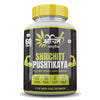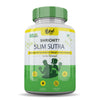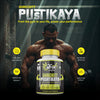Why do some people follow all the right muscle-building steps—eating more protein, lifting weights, staying consistent—yet still feel tired, weak, or slow to recover?
When most of us think about building muscle, we focus on macronutrients: protein, carbohydrates, and fats. They’re important, yes—but they’re only part of the story. What often gets overlooked is the group of silent drivers working behind the scenes: micronutrients.
Micronutrients—vitamins and minerals—control the very processes that help your body convert food into energy, repair muscle fibers after exercise, regulate hormones, and prevent fatigue. In other words, they make muscle growth possible.
Think about it. Have you ever:
-
Felt sore longer than usual after a workout?
-
Struggled with low energy despite eating well?
-
Hit a plateau in strength training even with high-protein meals?
These are real-world signs your body may be starved of key micronutrients. Without enough magnesium, zinc, iron, or B-vitamins, muscle repair slows, metabolism dips, and even your best workouts lose their impact.
Essential micronutrients drive muscle recovery and strength. So how do you spot deficiencies? And why are Indian dietary traditions and Ayurvedic principles crucial?
Understanding Muscle Micronutrients vs Macronutrients
To truly unlock your body's potential for muscle growth and sustainable strength, the distinction between macronutrients and micronutrients becomes critically important.
Micronutrients vs Macronutrients
Micronutrients are the vitamins and minerals your body needs in trace amounts to function efficiently. They control the biological systems that turn food into usable energy, build and repair muscle tissue, regulate hormones, and keep your immune system strong.
Nutrients—like magnesium, zinc, iron, calcium, and the full spectrum of B-vitamins—are massive in function. A slight deficiency in just one can compromise everything from your recovery speed to your muscle contraction, making workouts feel harder and gains feel slower.
Macronutrients: The Body’s Raw Fuel
In contrast, macronutrients are the nutrients you consume in larger amounts:
-
Protein: The raw material for muscle fiber repair and growth
-
Carbohydrates: The body’s primary energy source, especially during resistance training
-
Fats: Critical for hormone regulation, energy storage, and cell structure
These are measured in grams and contribute directly to your daily caloric intake. They give you bulk fuel—the energy and raw material to perform and grow.
Macronutrients cannot function optimally without micronutrients-
Both macronutrients and micronutrients for muscle recovery play vital roles. All the protein in the world won't help if magnesium deficiency prevents muscle relaxation, zinc shortage tanks testosterone production, or iron deficiency starves your muscles of oxygen.
The Biochemical Reality of Muscle Building
Muscle development is a process. After your workout, your body enters a state of repair. Damaged muscle fibers are rebuilt using amino acids from protein, powered by ATP generated from carbohydrates and fats. But this entire cycle—from energy metabolism to protein synthesis—relies on micronutrients as cofactors, enzymes, and signaling agents.
For instance:
-
Vitamin B6 helps metabolize amino acids from the protein you eat.
-
Magnesium activates over 300 enzyme systems including those involved in muscle recovery.
-
Zinc plays a direct role in DNA synthesis and cell repair.
-
Iron carries oxygen to your muscles for efficient endurance and energy.
Why This Matters for Lean Muscle Building
Gaining weight through fat is easy—eating in a surplus will do that. But gaining muscle requires precision: lifting smart, recovering properly, and nourishing your body at a cellular level.
A deficiency in even one micronutrient—say, vitamin D or magnesium—can slow your progress. And because most people focus only on calories or grams of protein, they unintentionally leave their muscle-building engine half-fueled.
Top Micronutrients That Aid Muscle Recovery and Growth
thinking about calories, protein shakes, and hitting the gym hard? you cannot recover well or grow stronger without the right micronutrients. These essential nutrients work silently behind the scenes, helping your body recover from workouts, regulate hormones, build new tissue, and generate energy efficiently.
Let's break down the most important micronutrients for muscle recovery and growth—especially one that fits the Indian context.
A. Magnesium: For Relaxation and Repair
Magnesium plays a central role in muscle contraction, relaxation, and recovery. It helps reduce muscle soreness after workouts (DOMS), maintains electrolyte balance, and supports over 300 biochemical reactions—including those involved in protein synthesis and energy production. It’s particularly crucial if you're doing strength training multiple times a week.
Benefits for muscle building:
-
Reduces cramps and tightness
-
Aids sleep quality (critical for muscle recovery)
-
Helps regulate calcium and potassium in muscle fibers
-
Supports stress resilience, keeping cortisol in check
Best sources:
-
Spinach
-
Pumpkin seeds
-
Bananas
-
Almonds
-
Black beans
B. Zinc: For Muscle Repair and Hormone Balance
Zinc is a trace mineral, but it carries major weight when it comes to muscle growth. It supports testosterone production, speeds up wound and tissue healing, and boosts immune strength—important because intense workouts temporarily suppress immunity.
Benefits for muscle building:
-
Supports muscle protein synthesis
-
Increases anabolic hormone levels (like testosterone)
-
Speeds tissue regeneration after micro-tears from training
-
Enhances digestion and nutrient absorption
Best sources:
-
Sesame seeds
-
Chickpeas
-
Cashews
-
Pumpkin seeds
-
Dairy (especially paneer and curd)
C. Iron: Oxygen Transport to Working Muscles
Iron is essential for transporting oxygen via hemoglobin to working muscles. Iron deficiency is one of the most common hidden reasons for low energy and poor performance, especially among vegetarians and women.
Benefits for muscle building:
-
Increases endurance and stamina during workouts
-
Reduces fatigue
-
Enhances oxygen delivery to tissues
-
Supports red blood cell production
Best sources (bioavailable):
-
Moringa leaves
-
Lentils (masoor, moong, rajma)
-
Jaggery (rich in non-heme iron)
-
Amaranth (rajgira)
-
Cooked beetroot
D. Vitamin D: Strength and Muscle Mass Maintenance
Vitamin D—deeply involved in muscle strength, endurance, and testosterone regulation. Deficiency in this vitamin leads to fatigue, frequent illness, bone weakness, and slower muscle recovery. Unfortunately, a large portion of the Indian population is chronically low in Vitamin D due to limited sun exposure and poor absorption.
Benefits for muscle building:
-
Increases muscle fiber size and strength
-
Boosts testosterone levels in men
-
Improves immune function and inflammation control
-
Enhances calcium absorption for stronger muscle contractions
Best sources:
-
Daily morning sunlight (20–30 minutes between 8–10 AM)
-
Fortified milk and cereals
-
Ghee
-
Eggs
-
Mushrooms exposed to sunlight
B Vitamins (B6, B12, Folate): Protein Metabolism and Energy
The B-vitamin family powers your body’s engine. B6 and B12 help convert protein and carbohydrates into usable energy, support red blood cell production, and improve nerve health. Folate is essential for DNA repair, cellular growth, and muscle tissue formation.
A deficiency in any of these leads to poor endurance, brain fog, slow recovery, and even muscle weakness.
Benefits for muscle building:
-
Supports amino acid metabolism
-
Prevents fatigue and poor oxygen transport
-
Boosts workout endurance and mood
-
Essential for nervous system coordination
Best sources:
-
Eggs (B12, B6)
-
Oats (B6, folate)
-
Leafy greens like spinach and methi (folate)
-
Whole grains like brown rice and millets
-
Curd, paneer, and sprouts
Indian Food Sources Rich in Muscle Micronutrients
To naturally enhance your micronutrient intake for muscle strength, traditional Indian foods offer powerful options rooted in centuries of Ayurvedic wisdom and daily dietary habits. These foods aren't just affordable and accessible—they're loaded with bioavailable vitamins, minerals, and phytonutrients that directly support muscle repair, strength, and endurance.
When people search for vegetarian muscle food, they often overlook the deeply nourishing value of native Indian ingredients. Here's a closer look at some of the most potent Indian superfoods that deliver micronutrients for lean muscle development, consistent energy, and holistic recovery.
🔹 Bajra (Pearl Millet): Iron-Rich Ancient Grain for Stamina
Bajra is a staple in many Indian households, especially in winter, and serves as a potent source of iron, magnesium, and B-complex vitamins. These nutrients play a crucial role in oxygen delivery, energy metabolism, and muscle endurance.
-
Muscle benefit: Supports oxygenation and reduces fatigue
-
Best use: Bajra roti with ghee and jaggery post-workout
🔹 Methi (Fenugreek): Hormonal Support and Muscle Tone
Both the seeds and leaves of methi offer excellent value for iron, magnesium, and zinc. Fenugreek also contains natural saponins, which have been shown to support testosterone balance, improving recovery and anabolic function.
-
Muscle benefit: Boosts testosterone, supports iron stores
-
Best use: Methi paratha or methi sabzi with curd
🔹 Drumsticks (Moringa): Complete Micronutrient Profile
Moringa leaves, commonly used in sambhar or stir-fried, are a powerhouse of vitamin C, calcium, iron, and potassium—making it a near-complete solution for cellular energy, bone strength, and muscle hydration.
-
Muscle benefit: Supports bone-muscle synergy, prevents weakness
-
Best use: Drumstick leaf soup or moringa powder in smoothies
🔹 Moong (Green Gram): Folate, Iron & Plant Protein Combo
Sprouted or cooked, moong is easy to digest and rich in folate, magnesium, and plant-based protein—a rare combination that supports lean mass gain and post-exercise regeneration.
-
Muscle benefit: Repairs tissues and supports protein synthesis
-
Best use: Sprouted moong salad or moong dal khichdi
🔹 Flaxseeds (Alsi): Anti-Inflammatory Omega-3 and Magnesium
Flaxseeds are loaded with alpha-linolenic acid (ALA)—a plant-based omega-3 fatty acid—along with magnesium and fiber. These nutrients ease DOMS (delayed onset muscle soreness), promote recovery, and improve joint flexibility.
-
Muscle benefit: Reduces inflammation and supports repair
-
Best use: Roasted flaxseed chutney with lunch or added to rotis
🔹 Jaggery (Gur): Iron and Electrolyte-Rich Natural Sweetener
Jaggery is more than just a sugar substitute. It delivers non-heme iron, potassium, and trace minerals, all of which improve blood quality, energy release, and electrolyte balance—especially after sweaty training sessions.
-
Muscle benefit: Boosts hemoglobin, supports post-exercise energy
-
Best use: Jaggery with roasted chana or in warm milk
Building Strength with Traditional Wisdom
Unlike synthetic supplements, these foods align with Ayurvedic nutrition and sattvic diet principles, focusing on purity, digestibility, and natural healing. They deliver micronutrients in highly absorbable forms, ensuring your body gets exactly what it needs to repair muscle tissue, regulate hormones, and sustain strength over time.
Whether you're aiming to gain lean mass, recover faster, or boost daily vitality, integrating these Indian foods rich in muscle micronutrients will give you a functional and flavorful edge—naturally.
How Deficiencies Affect Muscle Growth and Recovery
When your training, diet, and effort are all on point—but results remain slow, inconsistent, or exhausting—the root cause is often hidden. Micronutrient deficiencies are one of the most overlooked factors in muscle growth and workout recovery. These nutrients don’t just “support” your fitness—they enable it. Without them, the body lacks the tools it needs to repair tissue, regulate hormones, generate energy, and reduce inflammation.
How common micronutrient gaps directly impact muscle development, recovery time, and fitness progress—and what symptoms to watch out for!
1. Persistent Fatigue: More Than Just Tiredness
Even if you're getting 7–8 hours of sleep and eating well, lingering tiredness could point to low iron, magnesium, or B-vitamin levels.
-
Iron is responsible for transporting oxygen to your muscles. Without it, you may feel winded during simple exercises or struggle to complete your sets.
-
Vitamin B12 and B6 deficiencies disrupt energy metabolism, leaving you mentally foggy and physically drained.
-
Magnesium is essential for ATP (energy molecule) production. Low levels can leave you feeling wiped out—even after light workouts.
Symptoms to look for:
-
Midday crashes despite meals
-
Breathlessness during basic exercise
-
Heaviness in the limbs
-
Difficulty waking up rested
2. Poor Recovery: The Silent Progress Killer
You train hard. But instead of feeling sore for a day or two, your muscles stay tender, weak, or inflamed for several days. That’s a red flag for micronutrient insufficiency—especially vitamin D, magnesium, and zinc, which help the body turn on the repair process.
-
Magnesium relaxes tight muscles and eases cramping.
-
Zinc supports tissue regeneration and immune response during recovery.
-
Vitamin D reduces inflammation and supports protein synthesis.
Without these, the body remains in a prolonged stress state post-exercise, delaying muscle repair and reducing training frequency—both of which stall growth.
Symptoms to look for:
-
Soreness lasting beyond 48–72 hours
-
Muscle tightness not relieved by stretching
-
Unexplained aches even without training
3. Slow or No Progress: Hitting the Strength Plateau
When your reps don’t increase, weights feel heavier than usual, or you fail to see definition despite consistent training and eating, consider the hidden cost of micronutrient deficiencies.
Muscle growth is not just about protein and calories. It requires enzymes, co-factors, and cellular energy—all of which depend on micronutrients like:
-
Zinc (muscle-building hormones like testosterone)
-
Folate and B6 (amino acid metabolism)
-
Iron (oxygen delivery to developing muscle fibers)
Without these, even a perfect training plan won't deliver the results you’re working for.
Symptoms to look for:
-
Strength gains have stalled for over 4–6 weeks
-
No visible muscle change despite increased effort
-
Muscle tone remains soft or undefined
4. Muscle Weakness and Early Fatigue During Sets
Do your muscles start shaking midway through your routine? Do light weights feel heavier than they should? This is a sign of reduced neuromuscular efficiency—often tied to low Vitamin D, magnesium, and potassium levels.
-
Vitamin D supports the strength of fast-twitch muscle fibers
-
Magnesium and potassium regulate muscle contractions and nerve signals
-
Calcium helps muscles contract with force and control
Without these, performance dips during workouts and the risk of strain or injury increases.
Symptoms to look for:
-
Weak grip, early fatigue in push-ups or squats
-
Inconsistent performance from one session to the next
-
Muscle twitching or cramps
5. Frequent Illness and Inflammation
Muscle repair depends on controlled inflammation. When immunity is weak, the body stays in a catabolic (breakdown) state longer than necessary. This reduces recovery efficiency, raises cortisol levels, and interrupts muscle protein synthesis.
Symptoms to look for:
-
Getting sick frequently (cold, sore throat, low-grade fevers)
-
Joint discomfort after training
-
Chronic low energy or unexplained pain
Ayurvedic Insights on Micronutrients and Ojas
Ayurveda, India’s ancient system of healing, offers a deeply insightful and holistic view of muscle strength and recovery—far beyond calories, macros, or isolated supplements. Instead, it emphasizes the nourishment of dhatus (tissues) through natural, unprocessed, and mineral-rich foods that build both physical strength and inner vitality. Central to this is Mamsa Dhatu (muscle tissue) and Ojas—the subtle essence that supports immunity, resilience, and life force.
“Ayurveda emphasizes mineral-rich foods to build Mamsa Dhatu and strengthen Ojas, the core of vitality.”
This understanding directly mirrors modern science’s focus on micronutrients for muscle health—showing how time-tested practices and current research align in meaningful ways.
Mamsa Dhatu and the Foundation of Strength
In Ayurvedic physiology, the body is made up of seven dhatus, or tissues. Mamsa Dhatu, the third tissue layer, represents muscle, responsible not only for physical strength but also for endurance, structural stability, and protection.
Unlike modern muscle science, which often isolates nutrients like protein or iron, Ayurveda looks at the flow of nutrition through all dhatus, and considers whether food is being properly digested, absorbed, and transformed.
To nourish Mamsa Dhatu effectively, Ayurveda focuses on:
-
Wholesome, sattvic meals rich in bioavailable nutrients
-
Vata pacifying diet to ensure proper muscle tone and coordination
-
Rasayana herbs that rejuvenate tissues and support recovery
This broad approach supports natural muscle growth that’s balanced, sustainable, and energetically rooted.
Ojas – The Essence of Muscle, Immunity, and Resilience
Ojas is often translated as "vital essence." In physical terms, it represents the culmination of well-nourished dhatus—particularly Mamsa, Meda (fat), and Shukra (reproductive tissue). Strong Ojas results in:
-
Faster recovery from muscle fatigue
-
Strong immunity during intense training
-
Emotional stability and mental clarity
-
Greater stamina and physical endurance
From an Ayurvedic nutrition perspective, micronutrient-rich foods are crucial to maintaining Ojas—just as science shows that vitamins, minerals, and trace elements power metabolism, hormone balance, and cellular repair.
Rasayana Herbs for Muscle Ojas and Micronutrient Synergy
Rasayana herbs are rejuvenating botanicals that improve vitality, cellular health, and tissue regeneration. Some have direct links to micronutrient absorption, hormone regulation, and immune strength—making them ideal companions to any muscle-building lifestyle.
🔹 Ashwagandha
-
An adaptogen that reduces cortisol, increases endurance, and boosts testosterone naturally.
-
Promotes calm energy and supports recovery after strenuous workouts.
-
Also improves Vata balance, preventing muscle spasms or overuse injury.
🔹 Shatavari
-
Especially effective for nourishment and hydration of tissues.
-
Enhances strength and Ojas in those with depleted energy or overworked muscles.
-
Ideal for both men and women as a strength tonic and post-exercise restorative.
🔹 Kaucha (Kapikacchu / Mucuna Pruriens)
-
Rich in L-DOPA, it stimulates natural dopamine and testosterone production.
-
Enhances strength, muscle tone, and physical stamina.
-
Traditional Ayurvedic texts associate it with energy renewal and virility.
🔹 Shwet Musli (Safed Musli)
-
Known for supporting immune function, strength, and physical rejuvenation.
-
Often prescribed in Ayurvedic formulations to counter fatigue and weakness.
-
Supports post-illness or post-exercise recovery in high-performing individuals.
🔹 Gokshura (Tribulus terrestris)
-
Enhances libido, regulates blood sugar, and supports hormonal stability.
-
Used traditionally for improving urinary strength, which in Ayurveda links to muscle hydration and stamina.
-
Helps balance Vata, improving muscle contraction and joint stability.
These herbs act synergistically with natural food-based micronutrients, enhancing absorption and targeting the body's recovery pathways from a cellular and energetic perspective.
Vata Balance and Recovery Through Ayurveda
While herbs are powerful, Ayurveda insists that diet remains the first medicine. Certain food choices naturally support Ojas and muscle integrity:
| Food | Benefits |
|---|---|
| Ghee | Lubricates tissues, enhances mineral absorption |
| Mung dal | High in digestible protein and micronutrients |
| Dates & Figs | Natural iron and antioxidants for energy and recovery |
| Drumstick leaves (Moringa) | Dense in calcium, iron, vitamin C |
| Black sesame | Builds strength and supports dhatu nourishment |
| Bajra & Ragi | Magnesium- and iron-rich for stamina and Mamsa Dhatu |
| Warm khichdi | Eases digestion and improves nutrient uptake |
These foods, rich in essential vitamins and minerals, help bridge the modern concern of micronutrient deficiency with the Ayurvedic principle of dhatu-pushti—tissue nourishment.
Vata Balance: A Non-Negotiable for Muscle Stability
Ayurveda places special attention on Vata dosha, which governs movement, circulation, and nerve impulses. When Vata is aggravated—due to excessive training, irregular meals, or cold/dry foods—it leads to:
-
Muscle stiffness
-
Poor coordination
-
Joint pain or instability
-
Restless recovery
Ojas cannot flourish when Vata is imbalanced. This is why practices like:
-
Abhyanga (warm oil massage)
-
Warm meals with ghee and spices like ginger and turmeric
-
Regular sleep and daily routine
are essential for both micronutrient use and long-term physical strength.
Integrating Ancient Wisdom with Modern Fitness
Modern science has confirmed what Ayurveda has said for centuries: without mineral-rich, micronutrient-dense foods and recovery-supporting practices, muscle development remains incomplete.
By combining:
-
Rasayana herbs like Ashwagandha, Shatavari, and Kaucha
-
Ojas-enhancing foods like ghee, mung, sesame, and moringa
-
Vata-pacifying routines that ground energy and promote repair
…you set the foundation for sustainable muscle growth rooted in both biological function and energetic balance.
This is Ayurvedic muscle care at its best—resilient, intelligent, and aligned with your body’s deeper needs.
Rebuild, Replenish, Rise Stronger
Thinking about building lean, lasting muscle? You need more than macros and reps—you need strategy, intention, and deep nourishment.
Most fitness advice stops at protein intake and calorie counts. But as you've seen throughout this guide, micronutrients are the hidden drivers of true muscle health. They influence your recovery speed, your hormonal balance, your sleep quality, and your ability to adapt to training over time.
Without these essential minerals and vitamins, even the best workout plan won't produce optimal results.
From ancient Ayurvedic wisdom to cutting-edge nutritional science, one message is clear: real transformation begins inside.
Here’s What Smart Muscle Nutrition Looks Like:
-
Recognize the Signals
Fatigue, soreness, stalled progress, or mood swings might mean you're low on magnesium, B vitamins, or iron. These symptoms are often early warnings from your body. -
Replenish Intelligently
Use Indian superfoods like bajra, moringa, methi, moong, flaxseeds, and jaggery. These aren’t just healthy—they're bioavailable, nutrient-dense, and time-tested. -
Combine with Rasayana Herbs
Herbs like Ashwagandha, Shatavari, Gokshura, and Kaucha don’t just “boost energy.” They nourish dhatus (tissues), build Ojas (vital essence), and support deep recovery—something modern sports nutrition is only starting to understand.










